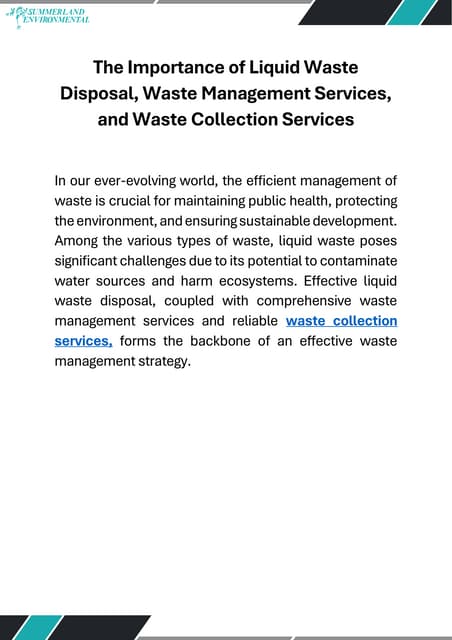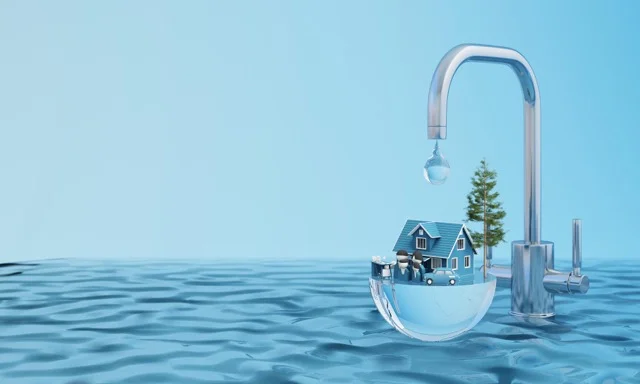Reclaim Waste Things To Know Before You Buy
Reclaim Waste Things To Know Before You Buy
Blog Article
Reclaim Waste Things To Know Before You Get This
Table of ContentsWhat Does Reclaim Waste Do?The Best Strategy To Use For Reclaim WasteReclaim Waste Fundamentals ExplainedOur Reclaim Waste DiariesThe Best Guide To Reclaim Waste
Explore the types, incidents, and forms of fluid waste. Residential sewage waste refers to the waste and products from a residential septic storage tank. This type of waste is produced by humans in homes, institutions, and other buildings. This only includes septic systems that have a drain field. The proper management and disposal of domestic sewer waste need liquid waste to be moved to a sewer treatment plant where the correct methods and equipment are related to detoxify and get rid of waste.
Business waste frequently includes potential hazards, such as combustible materials or a mix of fluid and solid waste items, and requires an extra sophisticated and comprehensive disposal procedure. The disposal of industrial waste typically involves the filtering of waste before transport to ensure safe and appropriate disposal. Hazardous waste is created from by-products and drainage of industrial procedures and manufacturing.
This sort of waste can not utilize the exact same sewer administration transportation or procedures as septic or commercial fluids. The hazardous waste management process needs the inspection and testing of fluid waste before it goes through the disposal process (liquid waste removal). Drainage waste is the fluid waste that originates from drainage and excess stormwater in extremely booming locations or cities
Overflow waste can cause contamination and flooding if not handled correctly. Making certain appropriate waste monitoring can avoid disasters and reduce ecological damage.
Not known Facts About Reclaim Waste
Call PROS Solutions today to find out about our waste administration and disposal services and the proper means to look after the liquid waste you produce.
(https://reclaimwaste1.blog.ss-blog.jp/2024-11-12?1731425991)
Do you know what takes place to your water when you disengage, flush the commode or drain pipes the washing machine? No? Well, it deserves knowing. This supposed 'wastewater' is not only a crucial resource but, after treatment, will certainly be launched to our land, rivers or the ocean. Used water from toilets, showers, bathrooms, kitchen area sinks, laundries and commercial processes is called wastewater.

water utilized to cool down equipment or tidy plant and devices). Stormwater, a form of wastewater, is overflow that moves from agricultural and city areas such as roof coverings, parks, gardens, roadways, paths and rain gutters right into stormwater drains, after rainfall. Stormwater flows unattended directly to neighborhood creeks or rivers, eventually reaching the sea.
The Ultimate Guide To Reclaim Waste
In Queensland, the majority of wastewater is treated at sewage treatment plants. Wastewater is delivered from residential or commercial websites via a system of sewers and pump stations, known as sewerage reticulation, to a sewage treatment plant. Neighborhood federal governments develop, keep and run most sewage treatment plants. Operators are accredited under the Environmental Protection Act 1994 to release cured wastewater at an acceptable environmental standard into waterways.
The Department of Natural Resources encourages neighborhood federal governments about handling, operating and preserving sewerage systems and treatment plants. In unsewered areas, city governments might need householders to install individual or house sewer treatment systems to treat residential wastewater from commodes, kitchens, bathrooms and washings. The Department of Natural Resources authorizes using family systems when they are verified to be effective.
In some brand-new communities, treatment of some stormwater to get rid of clutter, sand and crushed rock has actually begun making use of gross pollutant catches. Wastewater treatment takes place in four phases: Removes solid issue.
Wastewater then moves into big storage tanks where solids Discover More Here resolve and are eliminated as sludge. Grease and residue are skimmed from the surface area. Makes use of tiny living microorganisms recognizes as micro-organisms to damage down and remove remaining dissolved wastes and fine fragments. Micro-organisms and wastes are incorporated in the sludge. Eliminates nitrogen and phosphorus nutrients that can cause algal flowers in our waterways and threaten aquatic life.
Our Reclaim Waste Diaries
Nutrient elimination is not available in all sewage treatment plants since it needs pricey specialist tools. It is coming to be more common in Queensland. Clear fluid effluent generated after treatment might still contain disease-causing micro-organisms. If this effluent is launched right into rivers such as rivers or the sea, the micro-organisms will at some point pass away out.

The majority of wastewater streams into the sewage system. Under the Act, local federal governments carry out approvals and permits for eco appropriate tasks (Periods) involving wastewater launches that might have a local effect.
The 10-Second Trick For Reclaim Waste
Surveillance provides valid information regarding water quality and can verify that licence conditions are being satisfied. The details obtained via tracking supplies the basis for making water quality choices.
Report this page